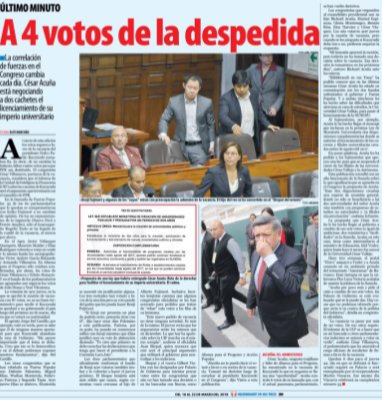Peruvian President Kuczynski resigns amid corruption scandal
LIMA, Peru — President Pedro Pablo Kuczynski resigned from office on Wednesday amid a corruption scandal, just weeks before President Trump is scheduled to visit the country for a major regional summit on improved governance in the Americas.
Kuczynski announced his resignation on television. He denied wrongdoing but said, “I don’t want to be an obstacle to our nation finding the unity and harmony that it so needs.”
Kuczynski is one of the most prominent politicians to fall in a wave of investigations across Latin America into alleged corruption linked to a Brazilian construction firm, Odebrecht.
The 79-year-old former Wall Street banker held several top political jobs in Peru before assuming the presidency in 2016. Impeachment proceedings against him had been scheduled to start Thursday.
His position became untenable after revelations about his lobbying for Odebrecht. According to local media, Kuczynski, before a closed-door congressional hearing last week, acknowledged a payment from an Odebrecht affiliate of nearly $700,000 in return for “verbal” products and “contacts.” That payment took place before he became president but after he had served as prime minister and economy minister. Many Peruvians regard that as a blatant conflict of interest, and some are asking whether it may have constituted the crime of influence-peddling.
Separately, videos emerged Tuesday of one of the president’s few allies in Congress appearing to offer kickbacks on public works to lawmakers in return for voting against impeaching Kuczynski.
The two developments appeared to have sent support for impeachment in the single-
chamber, 130-member legislature surging past the two-thirds majority necessary to oust Kuczynski.
chamber, 130-member legislature surging past the two-thirds majority necessary to oust Kuczynski.
Kuczynski offered his resignation just three weeks before Trump is due to visit the country for the Summit of the Americas, an annual gathering of the hemisphere’s leaders. The theme of this year’s event is improving democratic governance and fighting corruption.
Despite having one of the fastest growing economies in Latin America and being categorized by the World Bank as a “middle income” country, Peru remains plagued by stark inequality, endemic corruption and weak institutions. Many citizens still yearn for the kind of simple solutions once offered by Alberto Fujimori, an authoritarian president whose daughter Keiko heads the main opposition party.
The planned impeachment trial of Kuczynski was to have been the second in less than three months, reflecting the president’s prolonged battle with the opposition Popular Force party, which dominates Congress. A similar attempt failed just before Christmas after 10 lawmakers split from the party — including Kenji Fujimori, Keiko’s brother.
Three days after that unsuccessful impeachment attempt, Kuczynski pardoned the siblings’ father, Alberto Fujimori, who was serving a 25-year sentence for directing death squads and overseeing massive corruption during his 1990-2000 presidency.
Fujimori’s children were at odds over that pardon, with Keiko Fujimori opposed to her father’s liberation, apparently because she feared it could undermine her presidential chances and tight control of Popular Force. Running on a hard right agenda similar to her father’s, she was a close runner-up in the past two presidential elections and was defeated by Kuczynski in July 2016.
The pardon also appears to have helped doom Kuczynski, with most analysts agreeing that the center-right president was elected largely thanks to the votes of millions of Peruvians, including leftists, who were aghast at the Fujimori family’s possible return to power.
Political scientist Fernando Tuesta, a former head of the ONPE, Peru’s electoral agency, suggested Kuczynski had squandered his political capital through verbal gaffes and strategic blunders, including appeasement of Popular Force — until he saw the chance to split the party with the pardon.
Kuczynski “arrived in power despite himself, in a situation where the challenge was how to govern in an adverse context, and then he did everything to make it more adverse,” Tuesta said.
Although Kuczynski was not implicated in criminal bribe-
taking, the revelations about his earnings from a company that many view as synonymous with graft, and his apparent ability to profit handsomely from the contacts he had previously made as a government minister, stuck in the throats of many Peruvians. Kuczynski had initially denied receiving any money from Odebrecht.
taking, the revelations about his earnings from a company that many view as synonymous with graft, and his apparent ability to profit handsomely from the contacts he had previously made as a government minister, stuck in the throats of many Peruvians. Kuczynski had initially denied receiving any money from Odebrecht.
Meanwhile, his reneging on his promises never to free Alberto Fujimori had shredded his credibility. His final approval rating was 15 percent.
Kuczynski’s fall from grace confirms Peru’s status as the country, outside Brazil, most harmed by the sprawling Odebrecht scandal.
Of the three presidents who served between Fujimori and Kuczynski, from 2001 to 2016, one is in pretrial detention suspected of receiving illicit campaign funding from the construction giant, and another is fighting extradition from the United States on charges he took $20 million in kickbacks from the company. Both say they are innocent.
The third, Alan García, has sought to play down his ties to Odebrecht despite his 2006-2011 government awarding the company roughly $1 billion in contracts, more than any other president.
Odebrecht has admitted to paying $29 million in bribes to public officials in Peru between 2005 and 2014 in exchange for $12.5 billion in contracts.
For many Peruvians, the political landscape looks desolate, with demonstrators regularly repeating the anti-system chant of “Get rid of them all!
“If he does what Kuczynski did not, by really taking on the fight against corruption, and taking a firm line with Popular Force in Congress, then he could do well,” Albán said.
A relatively low-profile former governor of the small Moquegua region on Peru’s southern coast, Vizcarra has been serving as ambassador to Canada.








